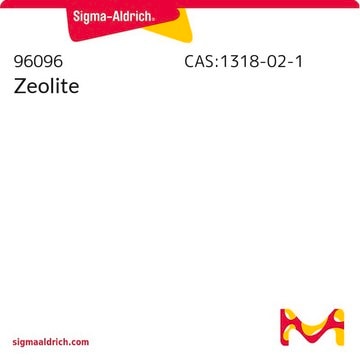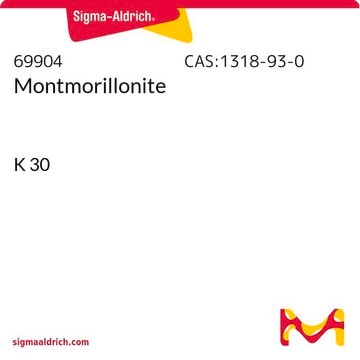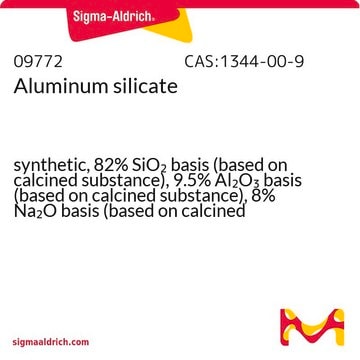All Photos(1)
About This Item
CAS Number:
EC Number:
MDL number:
UNSPSC Code:
12352100
PubChem Substance ID:
NACRES:
NA.23
Recommended Products
form
powder
concentration
~13% Mg
loss
≤10% loss on drying
SMILES string
O.[Mg++].[Mg++].O[Si]([O-])=O.O[Si]([O-])=O.[O-][Si]([O-])=O
InChI
1S/2Mg.2HO3Si.O3Si.H2O/c;;3*1-4(2)3;/h;;2*1H;;1H2/q2*+2;2*-1;-2;
InChI key
TUKQLEWOUPCTOS-UHFFFAOYSA-N
General description
Sepiolite is a hydrated magnesium silicate that belongs to the class of sepiolite-palygorskite. Its properties include high absorption capacity and good rheological behavior.
Application
Sepiolites can be used as absorbents for potential applications in catalytic systems and wastewater treatment.
Storage Class Code
11 - Combustible Solids
WGK
nwg
Flash Point(F)
Not applicable
Flash Point(C)
Not applicable
Personal Protective Equipment
dust mask type N95 (US), Eyeshields, Gloves
Certificates of Analysis (COA)
Search for Certificates of Analysis (COA) by entering the products Lot/Batch Number. Lot and Batch Numbers can be found on a product’s label following the words ‘Lot’ or ‘Batch’.
Already Own This Product?
Find documentation for the products that you have recently purchased in the Document Library.
Customers Also Viewed
Thermal and morphological characterisation of organically modified sepiolite
Tartaglione G, et al.
Microporous and Mesoporous Materials : The Official Journal of the International Zeolite Association, 107(1-2), 161-168 (2008)
Adsorption kinetics and thermodynamics of an anionic dye onto sepiolite
Alkan M, et al.
Microporous and Mesoporous Materials : The Official Journal of the International Zeolite Association, 101(3), 388-396 (2007)
Experimental and Atomic Modeling of the Adsorption of Acid Azo Dye 57 to Sepiolite
Karatacs D, et al.
Clays and Clay Minerals, 66(5), 426-437 (2018)
Dae-Hwan Park et al.
Journal of nanoscience and nanotechnology, 11(1), 382-385 (2011-03-31)
Sepiocite, a synthetic sepiolite-like nanoclay, was derived from hydrotalcite-like Mg2Al(CO3)0.5-layered double hydroxide (LDH) under phase transformation at 270 +/- 3 degrees C. The crystal structure of sepiocite is conceptually very similar to that of sepiolite derived from montmorillonite clay because
Qingwei Zhu et al.
Journal of hazardous materials, 217-218, 11-18 (2012-04-03)
Cuprous oxide is firstly created on acidized sepiolite (AS) by a simple deposition method for photocatalytic degradation of the red water produced from 2,4,6-trinitrotoluene (TNT) manufacturing. X-ray diffraction (XRD), field-emission scanning electron microscopy (FE-SEM), ultraviolet-visible diffuse reflection absorptive spectroscopy (UV-vis/DRS)
Our team of scientists has experience in all areas of research including Life Science, Material Science, Chemical Synthesis, Chromatography, Analytical and many others.
Contact Technical Service













